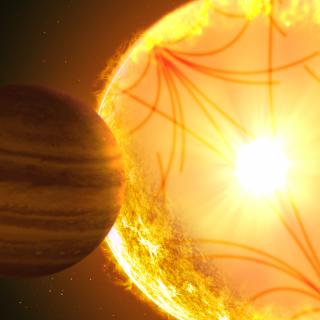Bibcode
Murphy, S. J.; Pigulski, A.; Kurtz, D. W.; Suárez, J. C.; Handler, G.; Balona, L. A.; Smalley, B.; Uytterhoeven, K.; Szabó, R.; Thygesen, A. O.; Elkin, V.; Breger, M.; Grigahcène, A.; Guzik, J. A.; Nemec, J. M.; Southworth, J.
Referencia bibliográfica
Monthly Notices of the Royal Astronomical Society, Volume 432, Issue 3, p.2284-2297
Fecha de publicación:
7
2013
Número de citas
38
Número de citas referidas
33
Descripción
The candidate SX Phe star KIC 11754974 shows a remarkably high number of
combination frequencies in the Fourier amplitude spectrum: 123 of the
166 frequencies in our multifrequency fit are linear combinations of
independent modes. Predictable patterns in frequency spacings are seen
in the Fourier transform of the light curve. We present an analysis of
180 d of short-cadence Kepler photometry and of new spectroscopic data
for this evolved, late A-type star. We infer from the 1150-d,
long-cadence light curve, and in two different ways, that our target is
the primary of a 343-d, non-eclipsing binary system. According to both
methods, the mass function is similar, f(M) = 0.0207 ± 0.0003
M⊙. The observed pulsations are modelled extensively,
using separate, state-of-the-art, time-dependent convection (TDC) and
rotating models. The models match the observed temperature and low
metallicity, finding a mass of 1.50-1.56 M⊙. The models
suggest that the whole star is metal poor, and that the low metallicity
is not just a surface abundance peculiarity. This is the best frequency
analysis of an SX Phe star, and the only Kepler δ Sct star to be
modelled with both TDC and rotating models.
Proyectos relacionados

Sismología Solar y Estelar y Búsqueda de Exoplanetas
Los objetivos genéricos de este Proyecto son: 1) el estudio de la estructura y dinámica del interior solar, 2) la extensión de dicho estudio al caso de otras estrellas, 3) la búsqueda y caracterización de planetas extrasolares por métodos fotométricos (principalmente mediante el método de tránsitos) y espectroscópico (variaciones en la velocidad
Savita
Mathur